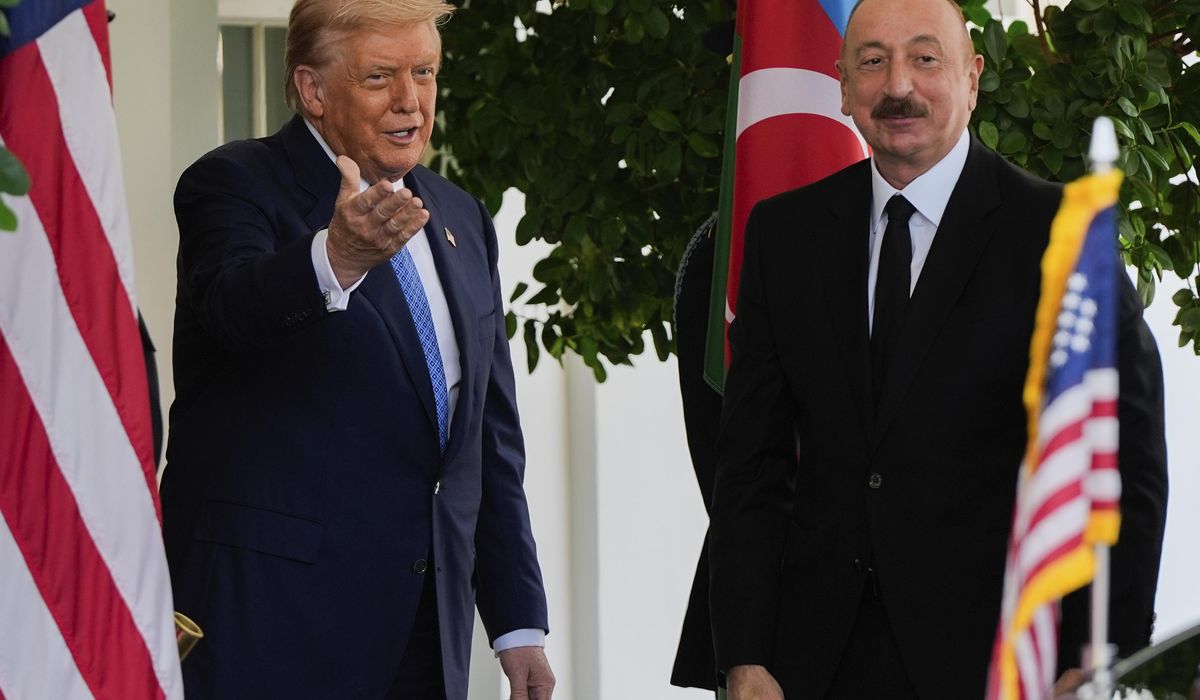


President Trump hosted a peace summit at the White House with the leaders of Armenia and Azerbaijan where they signed a peace deal to end their 35-year conflict and establish a “Trump Route” for trade.
The event on Friday showed that Mr. Trump clearly hopes momentum will carry over to negotiations for ending the war between Russia and Ukraine, with the president set to meet with the leaders of both nations soon.
Armenian Prime Minister Nikol Pashinyan and Azerbaijani President Ilham Aliyev praised Mr. Trump’s role in bringing them together. Mr. Pashinyan said the deal “lays a foundation to write a better story than the one we have in the past.”
Mr. Trump, sitting between them, said of the moment, “It’s a long time, 35 years, they fought and now they’re friends. And they’re going to be friends for a long time.”
He said it was a “great thrill” for him to see the two leaders come together.
“I love seeing good people get together and that’s what you have here: two great leaders,” he said.
White House spokeswoman Anna Kelly told reporters ahead of the signing Friday that “the roadmap they are agreeing to will build a cooperative future that benefits both countries, their region of the South Caucasus and beyond.”
The agreement includes a major transit route that will be called the Trump Route for International Peace and Prosperity.
She said the route will connect Azerbaijan to Nakhchivan, an exclave of Azerbaijan, through Armenia, which will allow “unimpeded connectivity between the two countries while respecting Armenia’s sovereignty and territorial integrity and its people.”
The deal gives the U.S. exclusive development rights to a strategic transit corridor, which could extend up to 99 years, the president said. The corridor, shortening the land route from Asia to Europe, will be operated under Armenian law. The hope is that the transit corridor will stop further fighting and open up the region.
Mr. Aliyev said it will be a day “remembered by the people of Azerbaijan with the feeling of pride and gratitude to President Trump for his attitude towards Azerbaijan, for his vision for not only our region.”
“We’re writing a great new history,” he said
Mr. Pashinyan said, “Together with the U.S., Armenia will work to bring to life the Trump route for peace and prosperity, connectivity project that will unlock the entire region, that will unlock strategic economic opportunities, that will create long term benefits. It will promote infrastructure investment, enhanced regional connectivity and strengthen U.S. leadership as a champion of conflict resolution.”
Senior administration officials said negotiations over who will develop the Trump route will begin next week, but that nine developers have already expressed interest, including several American operators.
Ms. Kelly said working groups will launch immediately to work out the details over the coming months.
“By locking in this path to peace, we are unlocking the great potential of the South Caucasus region in trade, transit and energy flows,” she said. “This president has yet again shown that we can move beyond long standing conflicts of the past and move towards the future.”
The leaders also signed a document exiting the Minsk Group, co-chaired by France, Russia and the U.S., to facilitate peace resolutions between the two countries.
Tensions have flared between Armenia and Azerbaijan since the late 1980s when Nagorno-Karabakh, a region of Azerbaijan with a mostly Armenian population, declared independence from Azerbaijan. Both countries gained their independence from the Soviet Union in 1991.
The energy-rich South Caucasus region, which includes Armenia, Azerbaijan and Georgia, has powerful neighbors: Turkey, Russia and Iran. Oil and gas pipelines run through the South Caucasus.
Middle East envoy Steve Witkoff traveled to the region in March to start the process of a peace deal. His team made multiple trips after that to work on an agreement.
The senior administration official said it was the Armenian’s idea to name the route after Mr. Trump, which Mr. Trump said it was “a great honor for me, I didn’t ask for this.”
The president said his “highest aspiration as president is to bring peace and stability to the world.”
This deal is just one of multiple peace deals he has produced in his short second term.
Among them was a pact between the Democratic Republic of Congo and Rwanda in June, ending three decades of fighting that saw 6 million people killed.
He has also been eager to get more countries to join the Abraham Accords, a 2020 agreement that normalized relations between Israel and other countries in the Gulf region.
Now Mr. Trump wants the fighting to stop among Israel and Hamas, Russia and Ukraine.
The president has produced multiple peace deals in his short second term and is openly talking about his chances of being awarded the Nobel Peace Prize, something he says he deserves but most likely won’t receive.
Both leaders Friday said they want Mr. Trump to win the Nobel prize. Azerbaijan’s leader suggested the two countries send a joint appeal for Mr. Trump to win the award to the committee.
Cambodian Prime Minister Hun Manet nominated him for the Nobel Prize for his role in stopping the fighting between Cambodia and Thailand.
The president also averted fighting between India and Pakistan.
“We stopped a lot of countries from war — India and Pakistan. We stopped a lot of countries,” Mr. Trump said Sunday. “You heard about Cambodia and Thailand. We got that one done. We got the Congo, which was going on for 31 years — Rwanda, that one’s done. We stopped a lot of wars.”
• Mallory Wilson can be reached at mwilson@washingtontimes.com.
